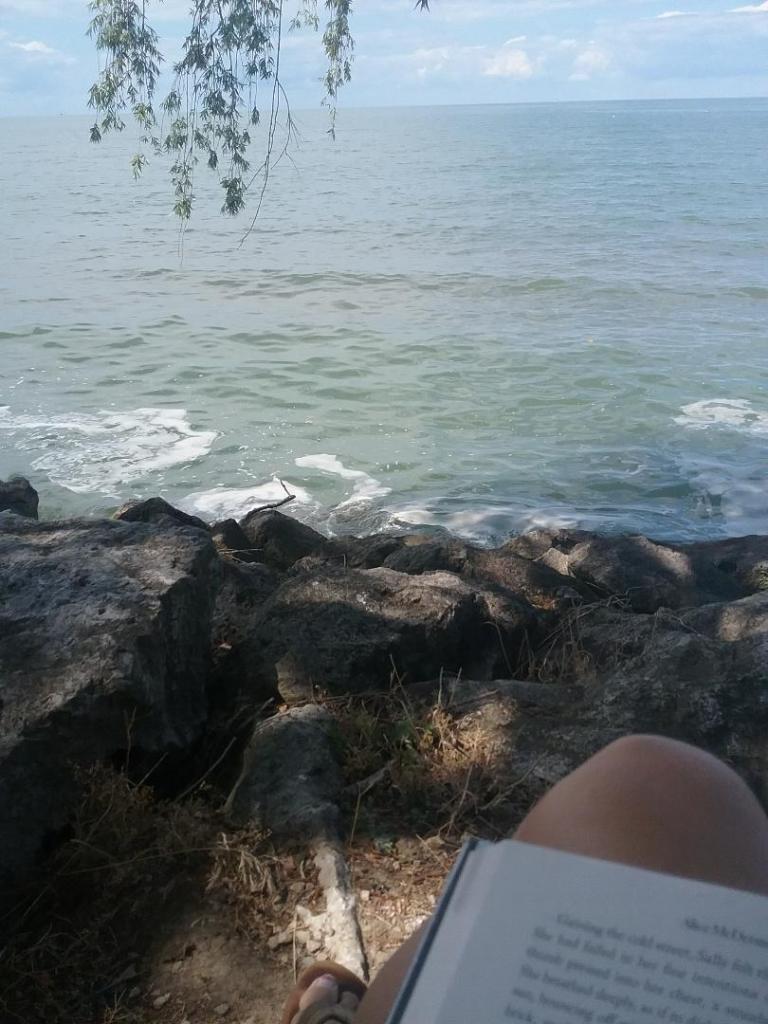I’m embarrassed to admit that, at first read, I took the title of JRW Case’s memoir, Cycling Through Columbine, at face value. That is, mostly literally. The cover image is of a man (maybe Case himself) on a bicycle, and I knew this memoir by my fellow Northeast Ohio native to be a travelogue–and the author to have a connection to Columbine. So you can see how I got there: cycling through, as in moving past, moving beyond the terrible 1999 school shooting that forever colored how we think of Columbine, Colorado.
It wasn’t until the recent school shooting in Uvalde, Texas, that I began to read the title’s first word in a different way–cycling as a repeating cycle of violence chronicled in these pages. The memoir is an emotional journey of remembrance and a physical journey of forward-moving action. But there is no moving beyond such violence, is there? Maybe only a “metabolizing,” as Case says, “the chaos of memories like those from Columbine.”
It was then that I lamented once more my own connection to a school shooting, however removed. Nearly 20 years after I graduated from Chardon High School, a student opened fire in the cafeteria, killing three other students. According to Wikepedia, the motive was a personal beef; the shooter is serving a life sentence. I’ve never written about this event, a stain on my hometown, but much more a stain on our collective American–and human–morality.
In one of Case’s blurbs, memoirist Emily Rapp Black summarizes the power of the reckoning with violence that Case attempts within these pages:
“The aftermath of Columbine is the aftermath for all of us.”
A little dust jacket plot summary to get you up to speed: JRW (Robert) Case’s “bicycle journey across the USA began during the summer of 2017, the story of which became this travelogue adventure, which includes a quest for values and the tragic massacre of Columbine in 1999 with its profound and pervasive implications. Robert worked then as a child protection attorney with a personal connection to one of the Columbine victims and deep ties to the community.”
If the form of this memoir is a bit ambitious–dual timeline narrative travelogue, utilizing written letters and texts from his past while contextualizing the narrative present with lesser-known history of spots along his route–Case’s heart is in it all. He grapples, and I like that kind of struggle for purchase in a memoir:
“…I find myself wondering if this adventure is more than just a travelogue about five guys who band together out of a shared interest in completing a bicycle tour across the USA,” Case says. “Or is it a coming of age story told by an aging parent trying to reconnect with a prodigal child, who is an adult daughter and Iraq war veteran? Or, maybe, the real story is a quest of a self-sufficient cyclist and former child protection attorney, who gets blown over by a ghost from Columbine, and has to come to grips with his long-avoided beliefs in a higher power?”
The memoir is all these things. Which makes me think that maybe neat narrative arcs are for fiction writers. Memoirs, like real life, can chart their own way, look forward and back, start and stop, and take detours before they find their way home.
Case’s bicycle journey begins is Astoria, Oregon, and ends in Minneapolis, Minnesota, short of his planned destination of Bar Harbor, Maine. Still, a summer of 2,000+ miles on a bicycle leaves him with plenty of time for exploration–emotional and physical, both. Case’s quest starts simply enough, as “a journey, a personal quest to reclaim some lost health and vitality.” He heads east, first among a group of cyclists, before breaking off on his own, left to find friendly campsites and the occasional motel room along with enough food-as-fuel to make the trip. The panniers over his bicycles sides can only carry so much. The one over his handlebars carries his trusty journal–the beginnings of this memoir.
“We have wind for breakfast this morning.”
In the reading of Case’s story, I note the camaraderie and language all its own between riders, these “self-propelled tourists,” and their bicycles. One of Case’s favorite things about cycling: “feeling a kind of kinship developing between me and this two-wheeled, mechanical device,” his own, Daedelus, named after the ancient Greek inventor. Cycling seems the perfect way to engage in a more eco-friendly tourism, while getting a real feel for the land and people along this country’s “blue highways.” Theirs is a much different experience than that of tourists enclosed in the metal, plastic, and glass of cars and trucks. All the senses are explored in this journey. “We have wind for breakfast this morning,” Case writes. Shortly into the trip, he and his pack of cyclists find themselves riding through several small-town July Fourth celebrations, and form a sort of Greek chorus in comment on the Americans they meet:
In one celebration they “joined in the festivities by purchasing, slicing, and consuming an entire watermelon, all five of us, in a grocery store parking lot. We aped for the passersby, grey-bearded men in bicycle attire laughing together and allowing the sweet sticky juice to run down our cheeks and chins. A few last-minute shoppers would even let their natural curiosity detain them long enough to connect with perfect strangers and ask the easiest of questions, “Where are you going? Where’d ya come from?” Such answers, for Case, are easier than the answers to the questions he’s sorting out in his mind on this quest for emotional peace.
A travelogue of this kind allows for much reflection, and Case turns his attention to sorting out one of the most harrowing events of his adult life, when two students from Columbine High School opened fire, killing twelve students and one teacher. In describing the events, Case’s voice is concise and clear, as it is throughout the memoir:
“When the shooting started, I was about fifteen miles away in Golden, Colorado, the home of Coors beer and Colorado School of Mines. But I worked at the courthouse. That’s where I was when I heard the news, eating lunch in the basement cafeteria…” his children were about the same age as the students who were killed, and, Case says, “that was more than I wanted to think about during the daylight hours.” The author was also there at the memorial service for the victims, national dignitaries spoke–with much grandstanding and not enough memorializing. “When do we start paying tribute to the victims?” Case wondered. The fact that the NRA was scheduled to come to nearby Denver within a week for its annual convention feels like fiction…but was not.
What’s that quote about time and distance?
Nearly twenty years later, on his cycling quest, Case would get the time in the saddle and distance–from Oregon to Minnesota–he needed to come to some emotional terms with Columbine. Except that it keeps happening, as we were reminded earlier this spring, when we learned of the news out of Uvalde. No printed record of these shootings can keep up, it seems. Case’s statistic is already out of date. “…more than two thousand living, breathing Americans have been killed or wounded in mass casualty events since the 1999 Columbine Massacre.”
How to balance grief with gratitude at being alive? For Case, a youth on his caseload left for school at Columbine one morning and never returned home. I struggle with this, as I drop my kids off at school each morning, and I pray. Case also grapples with the “higher power” and its place in our lives and finds a well-earned peace within these pages:
“With every crank of the pedals my endurance is building…my confidence grows. Today is for riding next to this wild and scenic river, a self-propelled visitor moving through majestic forests shimmering with filtered sunlight…I’m feeling grateful to be alive for the first time in years.”
Case’s memoir soars where he connects the emotional resonance of cycling with his emotional past. And in this connection, this parsing out of life’s lowest valleys and highest heights, we find hope. What more could we want from such a story?
Hope makes all the difference.
“The day is still young and there is hope for a better campsite ahead. My mid-morning fatigue is nothing compared to the hopeless resignation that once deadened my senses and stooped my shoulders when I came through the door after work on that first Friday evening, three days after the massacre. Hope makes all the difference.”
Thank you to the author for the copy for review!
*Features photo, free from Pexels, of Idaho, one of the states along JRW Case’s bicycle journey
Do you read memoirs? Have you written yours? Do you ride? Have you ever taken a cross-country trip? I’d love to hear about it. And, what are you reading or writing this week?
Want more Rust Belt writing, author interviews, book reviews, writing advice, and more? Follow me here. Thanks!













